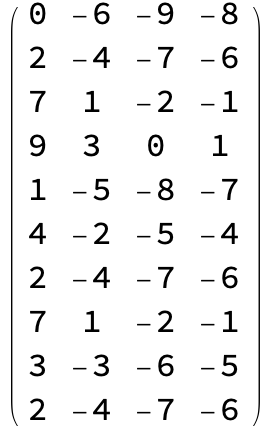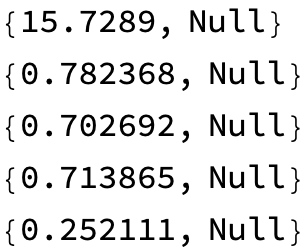I'm trying to construct a matrix $A_{ij}=X_i-Y_j$ where $X$ and $Y$ are vectors with thousands of real numbers. The fastest and closest thing I found is DistanceMatrix[X, Y], 0.4 seconds for 20000x10000 matrix, but the result only valid if $X_i>Y_j$, otherwise, the sign should be flipped. There is a way to flip sign relatively fast with LowerTriangularize (roughly takes another 0.5 seconds), but it works only if $X$ and $Y$ are of the same size. Maybe there is a way to calculate $A_{ij}$ as fast as DistanceMatrix does its thing? Or is there a way to quickly flip sign for matrix of arbitrary height and width? Any cycles work very slow.
5 Answers
Running on an M1 Max (essentially an 8 core machine). Not only does Compile compile faster than FunctionCompile; it also allows parallelization via OpenMP:
f = FunctionCompile[Function[
{
Typed[list1, "PackedArray"::["Integer64", 1]],
Typed[list2, "PackedArray"::["Integer64", 1]]
},
Table[i - list2, {i, list1}]],
UseEmbeddedLibrary -> True
]; // AbsoluteTiming
{1.6023, Null}
cf = Compile[{{a, _Integer}, {b, _Integer, 1}},
Table[a - Compile`GetElement[b, j], {j, 1, Length[b]}],
CompilationTarget -> "C",
RuntimeAttributes -> {Listable},
Parallelization -> True,
RuntimeOptions -> "Speed"
]; // AbsoluteTiming
{0.306628, Null}
m = 20000;
n = 10000;
a = RandomInteger[{1, 10}, m];
b = RandomInteger[{1, 10}, n];
A = f[a, b]; // RepeatedTiming
B = cf[a, b]; // RepeatedTiming
A == B
{0.225791, Null}
{0.0697286, Null}
True
Alas, you need to have a C compiler installed on your system.
-
$\begingroup$ I am stupid, I upvoted and forgot to ask: do you have any good recommendations for C-compiler for mac? With the apple silicon I mean. Not sure if you would like to include it as part of the reply here or maybe leave a comment in the chat. $\endgroup$– bmfCommented Feb 24, 2023 at 12:33
-
3$\begingroup$ I typically use Apple Clang shipped with XCode. I have never had any serious problems with it. Good alternatives are, of course, the (non-Apple) clang and gcc. You can install both of them with homebrew. All of them produce good code with similar performance. I use Apple Clang because (i) it is nicely integrated in the system and because (ii) it is generally a good idea to use the compiler produced by the hardware manufacturer unless you have good reasons not to do so. $\endgroup$ Commented Feb 24, 2023 at 14:38
-
$\begingroup$ Thanks for this. I will make sure to give it a try :-) $\endgroup$– bmfCommented Feb 24, 2023 at 14:40
-
-
$\begingroup$ Unfortunately
ParallelTableis still not supported inFunctionCompile... $\endgroup$– SilviaCommented Jul 6, 2023 at 5:17
Two more ways are suggested below. The output is the same as in @Syed's answer.
alist = RandomInteger[{1, 10}, 10];
blist = RandomInteger[{1, 10}, 4];
Then
😎= # - blist &;
😱 = Map[Subtract[#, blist] &];
and we do
😎/@ alist // MatrixForm
😱@alist // MatrixForm
Edit 1: taking the comment by @ Joshua Schrier into consideration, this is even faster
foo = Compile[{{a, _Integer, 1}, {b, _Integer, 1}},
Map[# - b &, a]];
foo[alist, blist]
Edit 2: taking the comment by @Ben Izd into consideration, for versions after 12 we can use
foo2 = FunctionCompile[
Function[{Typed[list1, "PackedArray"::["Integer64", 1]],
Typed[list2, "PackedArray"::["Integer64", 1]]},
Table[i - list2, {i, list1}]]];
foo2[alist, blist] // MatrixForm
Edit 3:
Comparing the RepeatedTimings of the various approaches so far.
$Version
With the lists
alist = RandomInteger[{1, 10}, 20000];
blist = RandomInteger[{1, 10}, 10000];
we compare the following
syed[l1_List, l2_List] := Outer[Subtract, l1, l2](*taking the comment by @Roman into account*)
😎 = # - blist &;
😱 = Map[Subtract[#, blist] &];
foo = Compile[{{a, _Integer, 1}, {b, _Integer, 1}}, Map[# - b &, a]];
foo2 = FunctionCompile[
Function[{Typed[list1, "PackedArray"::["Integer64", 1]],
Typed[list2, "PackedArray"::["Integer64", 1]]},
Table[i - list2, {i, list1}]]];
and now we measure
syed[alist, blist]; // RepeatedTiming
😎 /@ alist; // RepeatedTiming
😱@alist; // RepeatedTiming
foo[alist, blist]; // RepeatedTiming
foo2[alist, blist]; // RepeatedTiming
-
1$\begingroup$ Thanks a lot, that works just as fast as DistanceMatrix. $\endgroup$ Commented Feb 24, 2023 at 1:13
-
$\begingroup$ @VsevolodA. glad I was able to help :-) $\endgroup$– bmfCommented Feb 24, 2023 at 1:15
-
4$\begingroup$ You can shave off an extra 2-3x time by: ``` foo = Compile[{{a, _Integer, 1}, {b, _Integer, 1}}, Map[# - b &, a]] foo[alist, blist] ``` (change to
_Realif you want reals, etc.) $\endgroup$ Commented Feb 24, 2023 at 1:51 -
2$\begingroup$ If you're using version 12.0+, you can halve the timing of
Compileby usingFunctionCompile:FunctionCompile[ Function[{Typed[list1, "PackedArray"::["Integer64", 1]], Typed[list2, "PackedArray"::["Integer64", 1]]}, Table[i - list2, {i, list1}] ]]$\endgroup$– Ben IzdCommented Feb 24, 2023 at 5:29 -
3$\begingroup$ I would rather use
cf =Compile[{{a, _Integer, 1}, {b, _Integer}}, Table[Compile`GetElement[a, i] - b, {i, 1, Length[a]}], CompilationTarget -> "C", RuntimeAttributes -> {Listable}, Parallelization -> True, RuntimeOptions -> "Speed" ]... $\endgroup$ Commented Feb 24, 2023 at 7:10
As Henrik has demonstrated in his excellent answer, the good old C compiler interface is still super fast -- the fastest if considering the compiling time. But the new compiler (FunctionCompile) still stands some chance.
We see the high level way FunctionCompile[..., Table[...], ...] performs not so well. Intuitively, using ParallelTable instead should have accelerated it, except unfortunately that's not supported yet. So we'll have to go a bit lower level and endure some cumbersome code:
fparal = FunctionCompile[Function[
{ Typed[a, "PackedArray"["Integer64", 1]]
, Typed[b, "PackedArray"["Integer64", 1]] }
,
Module[{ca, cb, c, cc, la = Length@a, lb = Length@b}
, c = Array`NewPackedArray[TypeSpecifier["Integer64"], LiteralType[2], {la, lb}]
; ca = Array`GetData[a]
; cb = Array`GetData[b]
; cc = Array`GetData[c]
; Parallel`ParallelDo[ (* <- might use OpenMP`ParallelDo instead *)
Do[
ToRawPointer[cc, i lb + j, FromRawPointer[ca, i] - FromRawPointer[cb, j]]
, {j, 0, lb - 1}]
, {i, 0, la - 1}]
; c]
]]
20000*10000 is a bit too much for my RAM, so I'll test on smaller example (here cf and f are directly taken from Henrik's answer):
$Version
(* Out[]= 13.3.0 for Microsoft Windows (64-bit) (June 1, 2023) *)
m = 2000;
n = 1000;
a = RandomInteger[{1, 10}, m];
b = RandomInteger[{1, 10}, n];
cf[a, b] == f[a, b] == fparal[a, b]
(* Out[]= True *)
RepeatedTiming[ cf[a, b]; , 5]
RepeatedTiming[ f[a, b]; , 5]
RepeatedTiming[ fparal[a, b]; , 5]
(* Out[]=
{0.00354544, Null}
{0.00818736, Null}
{0.00342079, Null}
*)
So fparal performs as well as cf on my machine with an Intel i7 CPU. It would be interesting to see how fparal performs on Apple Silicon though.
-
$\begingroup$ Jepp, I can confirm that
fparalhas pretty much the same timing ascf(theCompileversion) on my Apple M1 Max. God job! $\endgroup$ Commented Jul 6, 2023 at 5:58 -
1$\begingroup$ I'd like to mention that the task at hand is very memory bound which is why not much speed-up can be seen (typical already few CPU cores fully saturate the memory bandwith). Would be cool to see a comparison also for some more compute-intense task... $\endgroup$ Commented Jul 6, 2023 at 6:01
-
2$\begingroup$ @HenrikSchumacher Thanks for your valuable comments! I would surely like to see how the new compiler competes in various compute-intense tasks. Unfortunately I don't have access to cutting-edge powerful computers for that kind of test. Frankly, on my daily work I still mainly use
Compilebecause of the incompatible compiling time, also because the still-lack-of-docs status ofFunctionCompile(like I have to search the source code to guess the usage ofNewPackedArray). $\endgroup$– SilviaCommented Jul 6, 2023 at 6:16 -
$\begingroup$ All fine. I myself also always use
Compileand will continue to do so untilFunctionCompileis more stable and better documented. =) "like I have to search the source code to guess the usage ofNewPackedArray" Very good. Thank you for you effort! $\endgroup$ Commented Jul 6, 2023 at 6:28
Using Outer:
alist = RandomInteger[{1, 10}, 10];
blist = RandomInteger[{1, 10}, 4];
{alist, blist}
{{2, 5, 1, 8, 1, 1, 9, 7, 1, 5}, {2, 9, 6, 2}}
(res = Outer[(#1 - #2 &), alist, blist]) // MatrixForm
$$\left( \begin{array}{cccc} 0 & -7 & -4 & 0 \\ 3 & -4 & -1 & 3 \\ -1 & -8 & -5 & -1 \\ 6 & -1 & 2 & 6 \\ -1 & -8 & -5 & -1 \\ -1 & -8 & -5 & -1 \\ 7 & 0 & 3 & 7 \\ 5 & -2 & 1 & 5 \\ -1 & -8 & -5 & -1 \\ 3 & -4 & -1 & 3 \\ \end{array} \right)$$
-
$\begingroup$ The issue is it will about 10 times slower than DistanceMatrix. $\endgroup$ Commented Feb 24, 2023 at 1:08
-
5$\begingroup$
Outer[Subtract, alist, blist]is easier on the eye. $\endgroup$– RomanCommented Feb 24, 2023 at 6:38 -
1$\begingroup$ A request could be put in for
SignedDistanceMatrix. $\endgroup$– SyedCommented Feb 24, 2023 at 8:27 -
$\begingroup$ @Syed signed distance only exists for 1d elements, while
DistanceMatrixworks for any vectors. $\endgroup$ Commented Feb 26, 2023 at 0:33
It's worth noting that Outer[Plus, v1, -v2] is much faster than Outer[Subtract, v1, v2], it's not the fastest, but very simple.
m = 20000;
n = 10000;
a = RandomInteger[{1, 10}, m];
b = RandomInteger[{1, 10}, n];
r1 = Outer[Plus, a, -b]; // AbsoluteTiming
r2 = Outer[Subtract, a, b]; // AbsoluteTiming
r1===r2
{0.614791, Null}
{26.8156, Null}
True
Henrik's cf on my computer
cf[a, b]; // RepeatedTiming
{0.218258, Null}
-
$\begingroup$ (+1) This timing difference is so weird that it should be filed as bug report... $\endgroup$ Commented Jul 6, 2023 at 15:21



